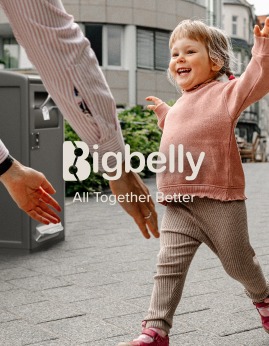
Jeff Satwicz, vice president of Bigbelly, discusses his experiences and entrepreneurial lessons with the New Tech Ventures class.
Editor’s note: The New Tech Ventures Blog is produced by students in the New Technology Ventures course, taught by Assistant Professor of Practice Stephen Brand. The course features tech leaders and entrepreneurs as weekly guest speakers, and students are sharing their insights on the ventures and the experience. This post was written by the team of Andrew Vaillancourt ’26, Fahad AlRasheed ’25, and Vyome Poddar ’25.
Jeff Satwicz, vice president of Bigbelly, the leading waste and recycling solution for public spaces, recently spoke to the New Tech Ventures class, sharing his story and experiences.
Born and raised in Massachusetts, Satwicz grew up in Winchester with a passion for creating. From an early age, he demonstrated an inventive spirit, often constructing Lego pieces into new practical designs. His interest in building expanded during his high school years, when he participated in a four-year STEM program. Satwicz realized while he was honing his skills earlier on in his life that the transformative power of technology and engineering further ignited his personal commitment to making a difference through innovation.
Satwicz later pursued a bachelor’s degree in mechanical engineering at Olin College of Engineering, a prestigious institution that values hands-on learning and creative problem-solving. While he was still working toward his degree, he founded his venture, Bigbelly, in 2003.
BigBelly is a product created to optimize energy usage for solar-powered trash compactors. The team revolutionized the compaction mechanism, electronics, and software logic, resulting in a system so energy efficient that it operates effectively even in low-sunlight regions. Throughout his work, Satwicz has demonstrated a commitment to sustainability, engineering excellence, and social impact. Such qualities continue to drive his impact in the tech-enabled waste management sector.
Engineers and Entrepreneurs
Through Bigbelly, Satwicz learned the importance of engineers and entrepreneurs working together. He gave an example of Bigbelly’s unity through their implementation of bins in New York City. They implemented their early bin design but did not do the due diligence to understand that the city does not have enough sunlight to support their trash compaction. The entrepreneurs in Bigbelly had to quickly make a pivot and figure out how to make the bins work without sunlight. They came up with implementing an alternative power source directly connected to the grid.
With just engineers, they would not have been able to come up with a solution to fix the NYC bins as easily. But, because of the unity in the company, they were able to make this type of pivot to meet the needs of their customers.
Despite being the oldest member of the company, Satwicz never became CEO and remained on the technical side of Bigbelly. He attested that everyone needs to play to their strengths in a company and this can be seen in the division of abilities for entrepreneurs and engineers at Bigbelly.
Focus on the Journey
The Bigbelly compactor wasn’t perfect on day one. Innovation and invention require trial, error, and persistence. Starting with a minimum viable product, repeatedly testing it, and continuously improving the product based on customer feedback is the way to move forward, even if it may be iterative rather than linear.
Pivoting in a business can be challenging and intimidating, especially when you already have committed a lot of time, effort, and money into your product. However, it is always better to pivot to a potentially better product than trying to get more out of a product that just does not work.
At Big Belly, Satwicz realized that the initial compactor was not just about compacting trash. It had greater potential by transforming waste collection into a data-driven process. Their pivot to IoT integration, which allowed them to monitor bin levels, helped them regain traction in the market by increasing their efficiency and providing greater customer value.
What Students Can Do Now
As business students, specifically Babson students, Satwicz urged the utilization of shared spaces with “different-minded” individuals as it was the diverse range of skills and collaborative environment with various engineers and entrepreneurs that made Bigbelly successful.
Satwicz preached the duality of experience and exposure. Throughout his entrepreneurial endeavors, he was able to gain experience while being exposed to new challenges and technologies. Having his own venture exposed him to various business-related processes, such as resource management, solving technical challenges, product refinement, etc., while also gaining experience in new technology that inspired innovation, such as IoT, energy efficiency, cloud computing, etc. By having a healthy balance of both, Satwicz was able to receive a well-rounded knowledge of the industry.
Reflection
Listening to Satwicz share his story of his upbringing and Bigbelly’s journey was both thought-provoking and inspirational. What specifically stood out to us, is how he emphasized the importance of diverse collaboration between entrepreneurs and engineers. A healthy balance between both were pivotal to overcoming challenges he faced with the bins’ initial design.
While we often gravitate toward those that share our commonalities, it’s our differences in education and experiences that enhance our abilities and broaden our knowledge. On a personal level, this reminded us of the importance of diverse perspectives in solving complex problems. It’s a concept we can see applying not just in startups but in our own team projects and future endeavors.
This reinforced the value of adaptability, the idea of pivoting a product, process, or even a mindset. While it’s easy to get attached to an idea or a system in place, growth stems from stepping out of our comfort zones, trying new things, and questing the status quo. Embracing change and evolution is how you can unlock your greater potential.
Posted in New Tech Ventures Blog



